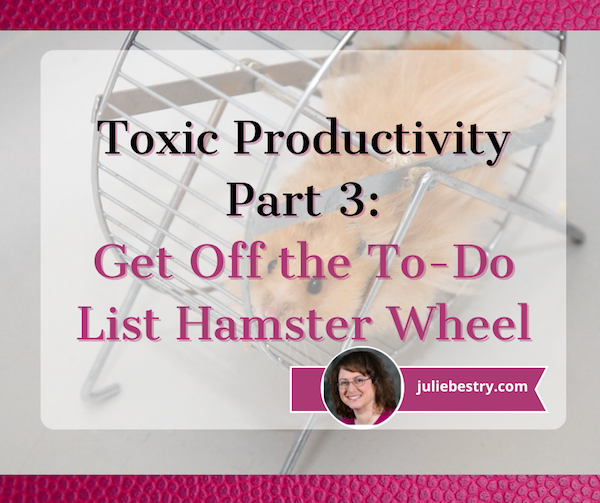
“Nothing is so insufferable to man as to be completely at rest…. He then feels his nothingness.”
~ Blaise Pascal, Pensées
Two weeks ago, in Toxic Productivity In the Workplace and What Comes Next, we looked at the external forces that drive unsustainable expectations and eventually burnout. We also examined what other industrialized nations have been doing to stem this dangerous trend.
Last week, in Toxic Productivity Part 2: How to Change Your Mindset, we examined productivity dysmorphia, the disconnect between objective achievements and our emotions about those accomplishments. When we experience productivity dysmorphia, the very act of pursuing productivity (to the neglect of all else) means we lose the ability to savor or enjoy what we have accomplished.
That second post focused on the ways to change our mindset about productivity. We examined how hedonic adaption gets us so used to our status as achievers, as worker bees, that eventually we will be unable to sustain that behavior and burn out. We reviewed the research that showed our brains require downtime and countered the many myths that exist about productivity.
Most importantly, we started a discussion regarding the role of work (and achievement, in general) in our identities, starting with Charlie Warzel and Anne Helen Petersen asking “Who would you be if work was no longer the axis of your life?” and considering the “finitude” of life (in the words of Oliver Burkeman and the Stoic philosophy of Seneca). We left off in contemplation that our value is not in what we do but in who we are — in being, not doing.
Today, we’re going to explore developing an appreciation of being over doing, seeing how our actions need not be achievements, per se, but can be experiences, valued solely for the potential delights they offer.
REVISITING FINITUDE: THE MACRO AND MICRO APPROACH
Our time on this rock is limited. A central tenet Burkeman’s 4000 Weeks: Time Management for Mortals is the ability to see the shortness of life, examine your goals and values, and maximize spending your time on what matters most. This isn’t some hippy-dippy philosophy that says that if we all stop worrying about work or making money, we’ll find ourselves in a vast utopia.
Rather, it notes that life is hard, life is short, and feeling like you only have a right to be here if you’re accomplishing things that make money — whether for your company or yourself (even, or especially, if you are your company) — leads to frittering away the most valuable commodity: life.
Tim Urban’s stellar Wait But Why blog broke ground in this arena. Allowing for a little more time on the planet than Burkeman, Urban posited that we might have 90 years of life, so 4680 weeks rather than 4000.
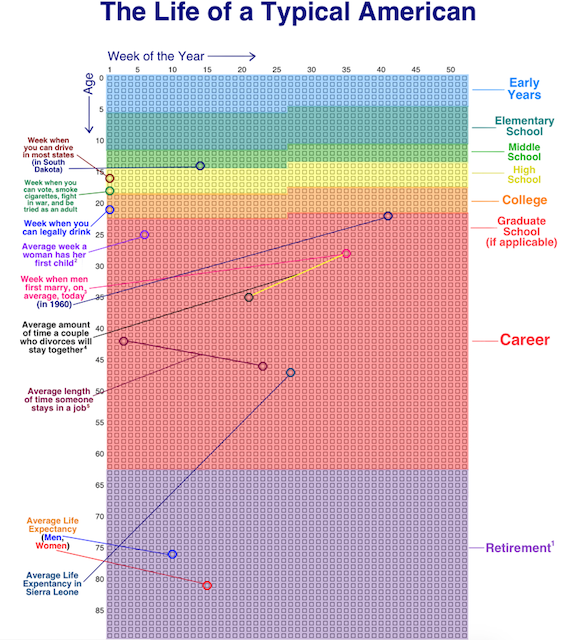
One of his most famous posts, back in 2014, urged readers: visualize your life in years, your life in months, your life in weeks, your life in number of remaining SuperBowls…to appreciate what you do with your time.
For example, I’ve got got 2860 of my weeks behind me. It’s tempting to use these kinds of visualizations for dismay; certainly they can lead to existential angst and even more productivity dysmorphia. “See?” one might yelp! “I have even less time to make the widgets! To earn the money!” And yet, as we’ve seen over the last two weeks, that attitude just leads to focusing more on the quantifiable value you create for others; we want to look at quality, not quantity.
But, we can still turn to Urban for guidance. As a follow-up to his macro look at the finitude of life, he developed a way to organize and examine our lives at the micro level in 100 Blocks a Day.
Inspired by Urban, nomadic programmer Jama of Notion Backups, has identified a way to pause and reflect, giving perspective on where you are, chronologically speaking, in your day (rather than in your life). Rectangles.app gives you a quick glance at how much of today has gone by, in ten minute increments, as of the point in your day when you click the link. Click later in the day, more boxes turn green.
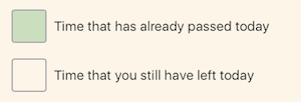
For example, when I visited and took this screenshot, I’d made it through 93 1/3 ten-minute blocks in my day.
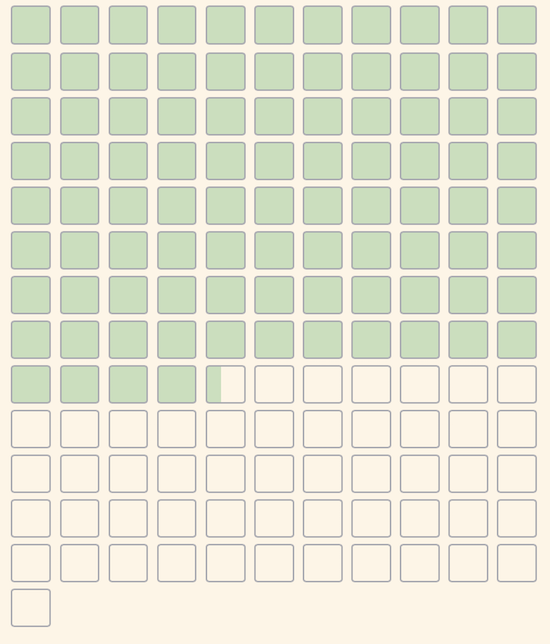
When faced with how much of your day has passed and how much is left, you might have the following reactions:
- Yikes, I’d better get cracking! (A good motivation if you’ve been staring at social media or playing a video game for hours on end, for sure.)
- Yikes, I’ve been working and working, and I’ve only written 17 TPS reports and attended 5 hour-long meetings! (A likely sign of productivity dysmorphia creeping in around the edges.)
- Yikes, all I’ve done all day is work. I haven’t talked to anyone I love, I haven’t exercised or gotten any fresh air. I haven’t laughed. (And here’s where the magic might begin!)
If you’ve been experiencing signs of burnout due to toxic productivity, give this approach a try. Click on Rectangles and think about the day you’re having. Maybe even text the link to a friend, describe your day thus far, and get a reality check from someone who sees you more clearly.
HOW TO GET OFF THE HEDONIC TREADMILL & STOP KEEPING SCORE
If you’ve gotten this far in this blog series, you might recognize that you (or someone you care about) is experiencing signs of toxic productivity or productivity dysmorphia. If you have trouble valuing what you’ve already accomplished, and especially if you experience difficulty spending your time on anything you can’t point to as an accomplishment, this section is for you.
We aren’t going to begin by saying, “Stop doing so much work” because that’s too big a step. Instead, I’m going to ask you to review the forthcoming suggestions and pick one or two to try, and carve out time in your schedule for doing them. Consider, on your first day, taking two or three of those boxes above, and before they pass by and turn green, experiment. Walk. Nap, Meditate.
Take a Walk
Exercise is great for us — it clears our heads and lets us reset to that default mode network we learned about last week from Jay Dixit’s We’re Doing Downtime Wrong in NeuroLeadership.
Of course, not all exercise is equal. Yoga is supposed to be good for us because it’s (mostly) gentle on the body, it focuses on correct breathing techniques, it improves strength, balance, and flexibility, it eases pain and benefits cardiac health, it dissipates stress, and much more. But yoga’s particularly advantageous for drop-kicking toxic productivity because there’s no scorekeeping.
Yes, I suppose you might feel competitive with the person next to you in class (not that you have to take a class) who has a more fluid downward-facing dog than yours. But in general, completing a yoga class feels less like, “I am a valid person because I can check today’s yoga off my list” and more, “Wow, my neck is no longer making that clicky-sound when I turn to the right!”
Contrast this with golf, for example, famously called, “a good walk spoiled.” (And no, trivia buffs, Mark Twain didn’t say that. He died in 1910, but the first reference to it was in 1948. The originator is a mystery.) Golf, indeed any game that involves precision and scorekeeping, probably isn’t going to help decrease your sense of always chasing after the next accomplishment, the next win.
Let’s start by stopping. Let’s stop counting our steps and counting the filled rings. (I’m not saying you can’t monitor your health-based metrics, but try strapping your Fitbit to your ankle to keep yourself from obsessively checking your step count.)
The great thing about walking is that there’s very little else of a truly productive nature, in terms of output, at least, that can be done while walking. You can’t handwrite, and while you can type or dictate into your phone, anything more than the odd inspiration is going to slow your pace and then stop you altogether, either because you’ll have forgotten to walk or you’ll fall right into a fountain.

For your mental health, the best thing you can do is just walk and explore your thoughts. Of course, that can be scary. Sometimes, the basis of toxic productivity is that one keeps working to avoid one’s thoughts. (Therapy can really help with that. Nudge, nudge.)
If you’re truly uncomfortable being alone with your own thoughts, try listening to soothing music or, if you must, a podcast. But the idea of this particular exercise (no pun intended) is to ease you into the notion of being comfortable doing nothing that earns you gold stars, nothing to check of the list. Try to walk to just walk.
One resource that might help is 52 Ways to Walk: The Surprising Science of Walking for Wellness and Joy, One Week at a Time by Annabel Streets.
From walking for meditation to walking barefoot, from walking in the rain to “walking like a Pilgrim,” (which, one assumes, is different from The Bangle’s Walk Like an Egyptian), the book explores unusual ways to incorporate walking in your life, and bits of research to give you some why to go with your what.
For example, did you know that a study published in Brain Research found that walking regularly and varying your speed results in improved concentration? (Maybe you can encourage your kids to take walking breaks between study sessions! There’s the benefit of that default mode network again!)
The key is to add activity to your daily experiences. Toxic productivity and the resulting burnout comes from failing to nurture your whole self, leading you to only envision yourself as a means of production, no more than livestock or a machine. Investing in yourself as a full human being helps break apart that idea that you must contribute productively at all times to be of value at any time.
Embrace Sleep
Are you feeling like you’re “always on” and that sleep will just leave you further behind?
This may seem hypocritical for anyone who knows Paper Doll in the real world. I am a notoriously “bad” sleeper, if you want to be judgmental about it. For the better part of half a century, I’ve been going to sleep later and later, about when the roosters wake and the “time to make the doughnuts” guy meets himself at the door.
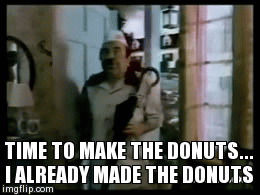
But although I have had a lifelong difficulty with getting to sleep, I am blessed with the ability to fall back asleep. And I’ve built my life (at least these last two decades) around working when my body clock makes me the most creative (afternoons with clients, late nights for writing) and getting all the sleep I want and need, just not at societally-approved times. I’ve accepted that my different sleeping patterns are atypical, and I would never sacrifice sleep in order to cross more tasks off my list.
Sleep is essential for our health. Did you know that getting poor sleep or not enough sleep leads to obesity? Sleep deprivation leads to higher levels of ghrelin (the hormone that tells your body when it’s time to eat) and lower levels of leptin (a horomone that regulates energy balance and inhibits hunger).
These levels are correlated with increased hunger, particularly with cravings for fat-dense and carbohydrate-dense foods. (Um, like doughnuts. Sorry about that.) And eating more of these kinds of foods increases the “neuronal reward pathways,” which can spur a sort of addictive response in the brain. (Note: I mean no disrespect and am not fat-shaming; I reference this solely for those concerned about dietary-related health.)
What the heck does this have to do with productivity or organizing or any of what this blog is about?
To be productive, we need to be able to disengage and re-set. There are many ways we accomplish this, but the brain depends upon sleep to flush toxins and achieve this re-set. The more sleep we lose due to “hustle culture” and the need to accomplish more and more, the less we can actually do. In 2011, a Harvard Medical School study found for the average worker, insomnia led to the loss of 11.3 days’ worth of productivity each year.
And the American Academy of Sleep Medicine found that “compared to those who regularly got 7 to 8 hours of sleep, those who reported getting 5 to 6 hours experienced 19 percent more productivity loss, and those who got less than 5 hours of sleep experienced 29 percent more productivity loss.”
It’s not just that lack of sleep makes us too loopy to grasp statistics or zoom through our work. It’s not just that missing our zzzzz cuts down on our to-do list checkboxes, but it makes us cranky and short-tempered with our bosses and clients, our friends and our loved ones.
And this isn’t a little thing. Chronic insomnia (whether it’s brought on by the stresses of toxic productivity or because we avoid sleep to keep working) is a risk factor for developing clinical depression and anxiety — and good luck trying to be productive when battling those!
So, getting adequate and high-quality sleep can not only help us be more productive; it can help us develop the mental health and physical stamina we need to support ourselves in crafting a life that places rest and life satisfaction on equal (if not higher) footing than constant productivity. A few highly recommended books on sleep include:
Why We Sleep: Unlocking the Power of Sleep and Dreams, by Matthew Walker, PhD.
The Sleep Solution: Why Your Sleep Is Broken and How to Fix It, by Dr. W. Chris Winter
And nighttime sleep isn’t the only kind of sleep to consider. Napping has value as well. I encourage you to peruse The Nap Ministry | Rest Is Resistance (both the blog and the forthcoming book) and consider that if you judge yourself for napping (or sleeping in general), that’s a good sign that you’re sinking into the trap of toxic productivity and undervaluing your health as you overvalue work tasks.
Stop Multitasking
We’ve talked about multitasking many times before, usually under the guise of eliminating the distractions that hurt our productivity. But multitasking can be tricky. In We’re Doing Downtime Wrong, Dixit identified common traps where multitasking detracts from mindfulness, which is another key to helping us both re-set our brains and get off the hamster wheel of feeling like we have to be always-on.
In Dixit’s words, “doing the dishes while listening to a true crime podcast” isn’t real downtime. Just do the dishes. Let your mind wander. Give yourself permission to just exist!
Shhhhhhhhhh
You may be wondering what quiet has to do with toxic productivity. Sure, we know that silence, or at least the absence of distracting noise, can improve our productivity. For example, a German study just prior to the pandemic proved that using noise-canceling headphones can improve focus, cognitive performance, and employee satisfaction in open-office environments.
We know that sound pollution distracts us; it keeps us from getting into the zone for deep work. But again, as with walking and other non-work tasks, we need to introduce more silence into our non-work time to normalize quiet and make the busy humming of accomplishment only one, but not the primary, experience of life.
Create opportunities in your life for a little more zen. Try driving with the radio off. (I know, it’s hard!) Consider dining without the TV on. Embrace quiet outside your body so you can hear what you need to tell yourself.
Ask the Hard Questions
Author Josh Kaufman has a blog post entitled 49 Questions to Improve Your Results. While that sure sounds like an invitation to more chase-your-tail productivity, the questions are a deep dive into self-analysis for improving your life satisfaction.
Kaufman organizes these questions under the following over-arching categories:
- Do I use my body optimally?
- Do I know what I want?
- What am I afraid of?
- Am I confident, relaxed, and productive?
- How do I perform best?
- What do I really need to be happy and fulfilled?
But don’t just read the ones I’ve bulleted above. I encourage you to read and think about the sub-questions Kaufman invites you to consider, from “What “states of being” do I want to experience each day?” to “What environment do I find most conducive to doing good work?” to “How often do I compare myself to my perceptions of other people?”
Questions like these may help develop a pathway out of any toxic tendencies.
Consider what a constant race for productivity is costing you
The more you’re caught up in toxic productivity, whether it’s pressed upon your by your work environment or you’ve developed productivity dysmorphia all on your own, it’s easy to make excuses. If you’re not continually productive, you might lose your job. You might lose your clients. You might lose your competitive edge.
But what else might you lose in this constant thrum of busy-ness?
In a recent newsletter, Graham Allcott wrote 10 Reasons To be Less Busy. It’s superb, and was one of the inspirations for me to look at toxic productivity on a larger scale. I encourage you to read the whole piece.
In the introduction to his list, where he acknowledged that our society makes that busy buzz of productivity into a badge of honor, Allcott noted:
The old saying is “if you want something done, ask a busy person”, but I’d add that if you want something done efficiently or with quality, then ask someone who is calm, focused and is good at saying “no”.
So let’s stop being busy. And let’s stop the glorification of busy, too. We need recognise what it really is – an inability to relax, an addiction to flattery or excitement, and an inability to make choices that make space for what matters.
Bam!
As with Burkeman’s Four Thousand Weeks, Allcott recognizes that life is fleeting and promising that you will slow down someday, when X occurs or Y is finished, is chasing your life away.
Just a few of my favorite bits from Allcott’s list are:
1. When you’re busy, you don’t see the bigger picture. That means that you’re missing opportunities or leaving easy wins on the table.
4. Being busy is the biggest cause of accidental unkindness.
5. Being busy doesn’t make you more productive. In fact it’s the opposite. The law of diminishing returns in knowledge work kicks in closer to 30 than 40 hours. Putting in more hours generally just means a lower average hourly return for your time. You’re far better off aiming for a well-rested and well-focused 30 hours than a frazzled 40+.
10. You don’t need to worry so much. You do enough. You are enough.
And then, with more wisdom per pound than in any newsletter I’ve read recently, Allcott asks you to ask yourself, “What difficult choices could I make this week, to unapologetically make space to be less busy and more me?”
In the next installment of this series, we’ll be looking at how we can take the advice, skills, and tools designed to make us more productive (in what often becomes a toxic way) and use them to our advantage in making us better at more life-affirming achievements.
Until then, can you see yourself employing any of these practices to slow down the speed of life? Please share your thoughts below.
Like this:
Like Loading...














Julie- There is something about this post that hit home for me. It’s not that the other two-parts of the series didn’t, but this one spoke to me on so many levels. One of the things that I recognized was how being productive and yes, ‘busy’ was something that was modeled by my parents. We used to joke about my mom that she slept with her eyes open. She didn’t. But she used to say, “You sleep one-third of your life away,” as if it were a bad thing, as opposed to an essential thing. My mom believed in doing as much as she could during her waking hours. And in essence, put those expectations on us (me and my siblings) too.
I never quite believed it, but felt guilty if I wasn’t doing and being productive all of the time. So appreciate Alcott’s wisdom, “You do enough. You are enough.” As I aged, I changed. There is still some leftover, residual guilt at times, but mostly I believe the importance of just being and NOT doing. I don’t mean all of the time, but sometimes. I need the stillness, the reset, and the calm.
So yesterday, my husband and I stood and watched as the various birds swooped down in our backyard to splash and bathe in our birdbath. We’ve had the birdbath for about a month and as of yesterday, there were no takers. But yesterday that changed. Maybe because it was hot, or maybe because the birds finally decided it was safe to explore. They landed on the birdbath, splashed, fluttered, and sat in the water. As much as they liked it, Steve and I loved watching them. We were transfixed. Laughing, squealing (well I was the squealer,) and witnessing something beautiful…the Robins having fun.
When we’re in the busy-mode, we can miss moments like that. We’re too focused on getting from place A to B, or accomplishing the next goal. We aren’t able to pause to experience something so joyful. Honestly, seeing the birds having fun made me want to jump in the birdbath too. But as we know, that wouldn’t have had a good outcome. Somehow though, I felt the joy and satisfaction standing still with Steve as we watched and delighted in the water activities outside.
I get it, Linda. I have good friends who’d tut-tut as though I should have been embarrassed when they’d call me and I was napping or it was too late in the day (by their standards) to be sleeping. My output/productivity sometimes exceeded theirs, but sleep outside from 11p-6a seems to be increasingly verboten in so many realms. (However, schools are finally recognizing that teens need more sleep, and later sleep, and are learning to schedule later starts, but only in wealthier communities that are able to accommodate the time shift.)
I am incredibly happy that Paper Mommy, who always accomplish(es/ed) a lot in every day never indicated that the point of life was to DO things. Indeed, she famously told me (and still tells me), “I’m proud of you before you even get out of bed in the morning.”
I’m so glad you got to delight in the birdies, and maybe you and Steve need to create an outdoor, splash people bath!
I love this post. My husband and I have been walking 2.3 miles or more daily since August of last year. Yes, even in the snowy winter days of Pennsylvania. =) One thing I learned from the experience of actually enjoying and observing each day is that I can genuinely say each day was an excellent observation of time and me in it. Sometimes my husband and I would talk about goals, things we needed to do, or just be quiet because we needed to process issues with work or a task each of us was working on. But walking and observing others going to work, kids going to school, animals running across the street, and people doing repairs to their homes, it took me out of my world and into another area altogether–the observation area. Doing this each day took me out of the routine of tasks and into a place of observance of others and being appreciative of my life, the place I live, and the nature around me.
I’m so with you, Sabrina. I walk a little over 4 miles a day, according to my Fitbit, and though I’m not always in the mood, once I’ve done it I feel so more in sync with myself. The sense of immediacy and the need to produce something all just ebb away. And though I’m not much for nature (bugs, trees, whatnot), being able to stride forward for an extended space really loosens up all those tight brain muscles! Thanks for sharing!
Charts! That’s quite a chart (The Life of a Typical American), and I always love a good Liz and Mollie chart (this one about productivity is one of their best). The Rectangles app, though, made me anxious, since the rectangles started ticking away before my very eyes as I was examining the site. Ack! I haven’t done nearly enough today! (Slept in, still eating breakfast, already worried about being productive…sigh…) Oh well, at least I have “Walk Like an Egyptian” on my brain now, which is fun, as earworms go. Thanks, Julie!
Yes, that one is really intense. I don’t know many people whose retirement is so long, but it definitely offers perspective. Rectangles can definitely go both ways, which is why I made the point about the various Yikes options, but it does make me pause and ask if I’ve done the right things that day, the things that are meaningful.
And yes, I’ve been humming “Walk Like an Egyptian” since I wrote the post! Thanks for reading and sharing your thoughts, Hazel!
I find myself pondering mortality ever-more-often with each year that passes, which is probably pretty normal. More and more, I worry less about seeing places or doing things or writing something wonderful than I do about contentment. I’ve always looked for contentment, but it’s becoming more central to my life all the time.
I love that you’ve shared these thoughts, Dava. For me, the longer I go, the more my contentment would come from going/seeing places and doing (unproductive, but joyous) things. I feel like I’ve been sitting and waiting for my grownup life to begin for decades, and I’m shocked to think that *this* is it. It’s like going in to take the SATs, reading a paragraph in the comprehension thing that makes your mind wander, and then next thing you know, you’re running out of exam time! Yikes, indeed! 😉
Julie, this series is one of your best. I love the concept of just being. Being still, appreciating the moments, and noticing that which is going on around you. I also like the idea of quality over quantity. My granddaughter has learned how to call me on the Portal. The other day she called and we had a lovely conversation about how to cut a peach. When she was visiting a couple of weeks ago I sliced peaches for her for breakfast. She wanted me to tell her how I did that so she could tell her father. It was an interesting and fun conversation. Time well spent.
Oh, Diane, thank you. This has been a very revealing and gratifying series to research.
A series of conversation about cutting a peach sounds like a lovely Zen koan! What a wonderful retelling!
I am reaching that age when people ask when are you retiring? I have been planning and developing things that I can do as I get older and give up other things. I often think about the age my Mom died and think if I knew when my time was “up” would I do something differently? I try to make decisions that are good no matter when my time is up. I agree that walking is important, it is to me. It doubles as silent time because people can’t get a hold of me to ask questions and solve problems. I also sit at the end of the day in silence to reflect. Sleep is my best place to be. Sometimes I get teased about how much I like sleeping and napping. For me, this post helped to confirm I am on the right path. Thanks for writing it.
You’ve made a great point about walking being akin to that “right to disconnect” I discussed in the first post of the series. That’s SO essential to unplugging from the busy hum of the world. In all of these ways, it sounds like you’re really doing things in the healthiest way.
Thanks for sharing your thoughts.
It’s like we were having a long-distance mind meld this week – although what I wrote was much shorter and less detailed, the idea of cutting off this obsession with productivity has definitely been on my mind. Perhaps, because in all of my years, I’ve finally developed the wisdom to detect the beginnings of burnout. I’m shutting it all down next week – social media, email, clients – and I’m just going to hang out, mostly with myself (maybe my family if they get lucky ;-)). There will be much sleeping and much walking, and staring at trees. I must say, I’m also relieved to see that middle school gets the least number of weeks! As always, such a thought-provoking post – brava!
I saw your tweet in regard to taking a full-on break, and I’m so proud of you. I bet you’ll take some gorgeous photos and have some keen life insights.
Thank you for your kind words!